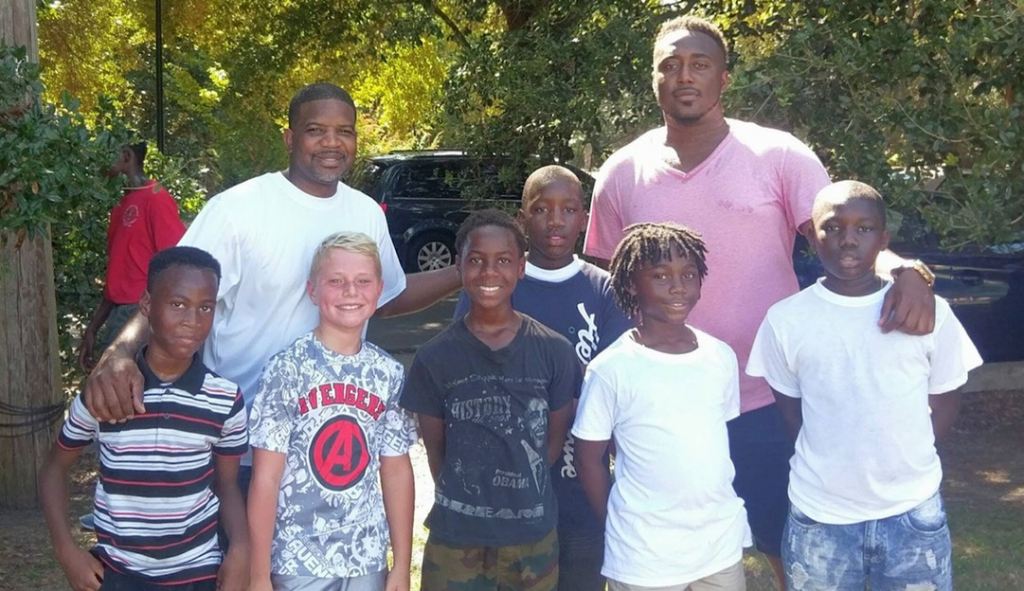We all want to live in clean, well-kept communities—but sometimes humans make that difficult.
Garbage happens when we’re not careful. The wind knocks over someone’s unsecured trash bin and the contents blow all over. Someone pulls keys out of their pocket and a gum wrapper falls out. Litterbugs toss fast food wrappers out of their car windows. Whether intentional or not, trash makes its way into gutters, bushes and waterways every day.
No one likes to walk down the street and see garbage littering the ground or graffiti covering buildings. But it’s not just unsightly. According to Keeping America Beautiful, the largest litter study conducted in the U.S., litter abatement costs more than $11 billion dollars per year.
[rebelmouse-image 19398294 dam=1 original_size=”700×525″ caption=”Photo by Dustan Woodhouse/Unsplash.” expand=1]
A dirty neighborhood also lowers perceived home values, affects quality of life and can even impact our health. However, something as simple as a community garden can totally revitalize a neighborhood. We all do better when our communities are taken care of.
While municipalities are usually responsible for trash pickup and maintenance, we can all make a difference when it comes to keeping our communities clean. All it takes is a little cooperation, creativity and commitment.
Organizing a community cleanup can be super simple, but also loads of fun.
As a parent with three kids of drastically different ages, it’s often been a challenge to find volunteer work that we can do as a family. But the beautiful thing about a community cleanup is that people of all ages can participate and do a great job in the process.
A cleanup can be as simple as going for a family walk through your neighborhood, and bringing a glove and a trash bag along with you. But if you want to go bigger, you can plan ahead and invite others to join you in an area of your town that needs some extra attention.
[rebelmouse-image 19398295 dam=1 original_size=”500×276″ caption=”Photo via Frank Boston/Flickr.” expand=1]
With community email lists such as NextDoor, putting out a cleanup call to your neighbors is easy. You can also make it a friends and family affair by combining a service project with a social gathering, like going out to dinner as a group to celebrate a job well done.
1. Start with an organized plan of attack.
To organize a trash pick-up, choose an area to tackle. Look around for areas where the wind blows garbage into bushes or ditches or along fence lines. Then, make sure everyone knows the who, what, where, when and how, which should include:
- The date and possible rain date
- Meeting location
- Number of volunteers needed
- Outline of the work you plan to complete by the end of the day
- List of supplies you need people to bring
- List of required permits or licenses you need to secure ahead of time
- Post-event steps.
Have everyone bring gloves (gardening or work gloves are more comfortable and less sweaty than plastic gloves) and two bags—one for trash, and one for recyclables. Once you’ve gathered at the agreed upon central location, make a plan of attack, sending teams of two or three to cover specific areas.
2. Add an extra dose of fun by making your cleanup into a scavenger hunt.
[rebelmouse-image 19398296 dam=1 original_size=”700×467″ caption=”Photo by Vova Drozdey/Unsplash” expand=1]
Give each team a checklist and see who can find all of the items. There are common types of garbage you’ll find in almost any city or town. Include those things in your list, but add some unique trash items as well. A sample scavenger hunt list might look like this:
- 10 Soda cans
- 10 Glass bottles
- Straw
- Fast food bag
- 5 Cigarette butts
- Plastic lid
- Candy wrapper
- Plastic utensil
- Something metal
- Something purple
- Something square, etc.
3. Think beyond the trash can and look for other ways to beautify your community.
While picking up garbage is a simple, straightforward way to make a difference, there are other methods of sprucing up a community that you can factor into your cleanup day.
Take a look around your area. Are there abandoned buildings or lots that could be revitalized? Could they be used for something like a community playground or garden? Maybe you can approach your town officials about organizing a volunteer painting party for that run-down community center. What if you and your neighbors offered to pressure wash the graffiti off of walls? Is there a public space that could use some TLC?
[rebelmouse-image 19398297 dam=1 original_size=”640×424″ caption=”Photo by Max Pixel.” expand=1]
The revitalization options in your neighborhood are only limited by your imagination.
4. Have a plan for Debris Removal
This is something you don’t want to have to figure out after the fact: you will need a way to get rid of the waste you collect at your community cleanup. Whether your volunteers are picking up debris, painting over graffiti or planting new flowers, you will have trash at the end of the day. Call your city government at least a month in advance and ask about options for scheduling a trash and recycling pickup. If you’re going for a waste cleanup record, consider renting a dumpster.
Some dumpsters offer their services free of charge to qualifying events around the country. If you would like your community cleanup to be considered for a dumpster donation, fill out this request form.
5. Keeping our communities clean is an ongoing effort.
[rebelmouse-image 19398298 dam=”1″ original_size=”640×428″ expand=1]
Anyone who has engaged in a community cleanup project knows the joy of seeing an area looking pristine—as well as the disappointment in realizing that pristine doesn’t last. But that’s simply the nature of cleaning. Just as you have to clean your house regularly to keep it fresh and tidy, a neighborhood or town requires ongoing effort to keep it looking and feeling good.
Everyone can participate by being helpful stewards of our public spaces. And when we rally others to join in these efforts, we can all share the satisfaction that comes with caring for our communities and seeing them at their best.
Clorox is committed to providing a gentle yet powerful clean, which is why they’ve partnered with Upworthy to promote those same traits in people, actions and ideas. Cleaning up and strength are important aspects of many of our social good stories. Check out the rest in the campaign to read more.

















